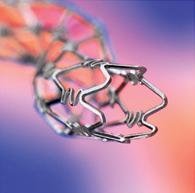
The Cordis Cypher Stent
April 10, 2009 - The results of the ZEST randomized controlled trial released at ACC 2009 showed the Cypher Sirolimus-eluting Coronary Stent significantly outperformed the Endeavor and Taxus Liberte in the key clinical outcomes of ischemia-driven target lesion revascularization (TLR) and stent thrombosis through one year.
TLR is the need for another interventional procedure to open a blockage in the previously stented area. The rates of ischemia-driven TLR and target vessel revascularization (TVR) were lowest in the Cypher group compared to the Endeavor arm (TLR=1.4 vs. 4.9 percent; and TVR=1.9 vs. 5.2 percent) and the Taxus Liberte (TLR = 1.4 vs. 7.6 percent; and TVR = 1.9 vs. 7.7 percent.
However, Endeavor faired slightly better than Cypher and Taxus in the study by having the lowest number of deaths or myocardial infarctions at one year, with Endeavor at 5.8 percent compared to Cypher at 7 percent and Taxus at 7.6 percent.
Cordis, the maker of the Cypher, said ZEST is the largest randomized controlled trial comparing three drug-eluting stents. The company said as in previous trials, like SORT OUT III, the Cypher outperformed Endeavor and Taxus Liberte in terms of key clinical outcomes like TLR and TVR.
In terms of the safety parameters, the company said Cypher had a trend for lower MACE (major adverse cardiovascular events, such as death and heart attack and repeat revascularization) rates at one year - the primary endpoint in the study - than the Endeavor (8.3 vs. 10.1 percent, respectively), and significantly lower rates of MACE than the Taxus Liberte (14.2 percent). The Cypher also had significantly lower rates of stent thrombosis at one year compared to the Endeavor (0.0 percent vs. 0.7 percent) and the Taxus Liberte (0.8 percent).
ZEST was a multicenter, randomized trial of 2,640 patients designed to assess the safety and efficacy of the Endeavor as compared to the Cypher and Taxus Liberte in real world patients. Each treatment arm included approximately 880 patients. The trial was supported by research grants from the CardioVascular Research Foundation, Seoul, Korea, the Korean Ministry of Health and Welfare, and Medtronic Vascular.
Medtronic, maker of the Endeavor stent, said at ACC the ZEST study data showed the Endeavor was not inferior to the Cypher and there was no statistically-significant difference between Endeavor and Cypher. The company also said Endeavor was associated with a statistically significant 29 percent reduction in the composite primary endpoint of death, myocardial infarction (MI) and in ischemia-driven TVR, when compared to the Taxus Liberte at one year.
Boston Scientific’s Taxus Liberte is currently the market leader in the U.S., but Medtronic pointed out the trial results show it to be associated with a 25 percent increase in death and MI, and a 32 percent increase in the need for repeat revascularization when compared to the next-generation Endeavor.
For more information: www.cypherstent.com, www.cordis.com, www.medtronic.com, www.bostonscientific.com


 January 05, 2026
January 05, 2026 









